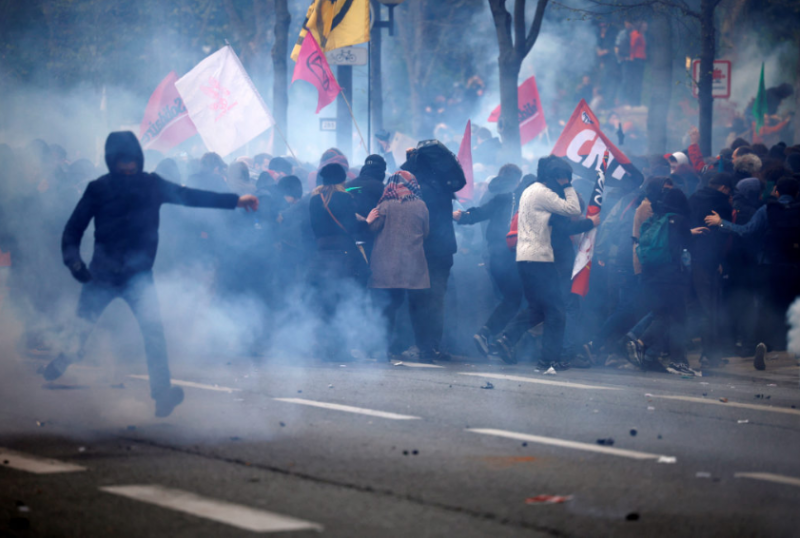
Paris: Hundreds of thousands of people took to the streets across France on Thursday to protest President Emmanuel Macron's pension reforms, in the final day of protests before a crucial court decision on the legislation.
As on previous protest days, there were clashes between police and protesters across the country, and demonstrators also stormed the Paris headquarters of French luxury goods firm LVMH.
On Friday, all eyes will be on France's Constitutional Council, the country's highest administrative authority, which will announce its final say on the pensions legislation, the final hurdle before Macron can sign it into law.
Also Read: Russia claims that Ukrainian forces have cut off access to Bakhmut
On Thursday, police expect between 400,000 and 600,000 people to take part across the country. That would be less than half of the nearly 1.3 million people who marched in March in opposition to the reforms, which include raising the retirement age from 62 to 64.
"Now is not the time to give up, because that is what Macron expects," said Johan Chivert, a student in the central French Creuse region. "We have to keep going and show that the people are against this reform."
Security forces were on high alert, with approximately 1,500 anarchist and radical protesters expected in Paris, and regional towns such as Nantes and Rennes are once again seen as potentially volatile.
"The decision of the constitutional court on Friday will put an end to democratic and constitutional procedures," Macron told reporters on Wednesday during a visit to the Netherlands, adding that public debate "will undoubtedly continue."
If the court gives the go-ahead, which ministers privately believe it will, Macron hopes to sign the changes into law immediately, paving the way for them to take effect before the end of 2023.
Also Read: ASEAN action is being sought as the bloc'strongly condemns' a deadly Myanmar airstrike
After repeatedly ignoring calls for talks with union leaders in recent weeks, the 45-year-old leader stated that once the court decision was published, he would invite labour representatives for discussions.
If the law is passed, it remains to be seen whether unions will call more strikes, as momentum is clearly waning and employees are hesitant to forego pay for what appears to be a losing battle.
The majority of trains will run on Thursday at the state rail operator SNCF and the Paris public transportation provider RATP, both of which have previously been strike bastions. The movement is "far from over," said Laurent Berger, the head of the CFDT union, as the demonstration began in Paris, vowing major protests on May 1 labour day.
The hard-left CGT union has called for new strikes by refinery workers and garbage collectors, whose March walkout left Paris streets littered for three weeks.
According to local authorities, workers blocked the entrance to the Feyzin refinery near Lyon for two hours early Thursday before police intervened. Others surrounded a garbage incinerator outside of Paris.
Protesters and police clashed in Nantes, a flashpoint of tension in recent weeks, after a Mercedes car and bins were set on fire.
Protesters briefly occupied LVMH's headquarters on central Paris's glitzy Avenue Montaigne and set off smoke flares.
"Mobilisation must continue because this bill cannot see the light of day," Manuel Bompard, a leading lawmaker for the hard-left opposition party France Unbowed, told France 2 on Thursday.
According to polls, roughly two-thirds of French people oppose the pension changes, but Macron argues that they are necessary to prevent the system from collapsing in the coming decades.
Critics accuse the president of ignoring public opinion and parliament, where the minority government used controversial executive powers to pass legislation without a vote at the end of March.
In a speech in the Netherlands, Macron linked the pension changes to the need for France to rein in public spending and his broader agenda of closer economic ties among EU members.
Also Read: IMF chief calls on the world to prevent a "second Cold War"
"I'm proud of the French social model and defend it, but if we want to make it sustainable, we have to produce more," he said. The country must be re-industrialized. We need to reduce unemployment and increase the amount of work being done in the country. This pension reform is a component of it."